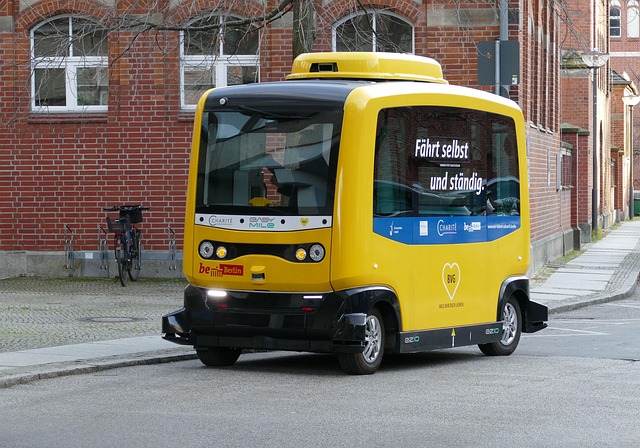Understanding Autonomous Driving Technologies is crucial when selecting a Self-Driving Car (Select Autonomous Vehicles). These vehicles rely on sensors, AI, and machine learning for navigation. Advancements in LiDAR, radar, and cameras improve safety and detection. Legal frameworks ensure consumer protection and address liability concerns. Accessibility features cater to the disabled, aiming for an inclusive future of mobility. Key features include advanced driver-assistance systems (ADAS) and high-resolution sensors. Top brands like Tesla, Waymo, Cruise, and NIO offer diverse options. The rise of Select Autonomous Vehicles brings legal and safety challenges, particularly in insurance claims. These vehicles promise safer, efficient commutes, enhanced accessibility, and reduced environmental impact. AI applications can revolutionize farming and transportation across sectors.
“Unveiling the future of transportation, this article explores the best self-driving cars available today. From understanding cutting-edge autonomous driving technologies to deciphering key features, we guide you through the dynamic market. Discover top brands and models leading the way, and gain insights into the legal and safety considerations shaping this revolutionary sector. Additionally, we delve into emerging trends poised to transform your driving experience with select autonomous vehicles.”
- Understanding Autonomous Driving Technologies
- Key Features to Consider in Self-Driving Cars
- Top Brands and Models in the Market
- Legal and Safety Aspects of Autonomous Vehicles
- Future Trends Shaping Self-Driving Car Experience
Understanding Autonomous Driving Technologies

Understanding Autonomous Driving Technologies is a pivotal step in evaluating the best Self-Driving Car. Autonomous Vehicles (AVs) leverage a diverse array of technologies to navigate and make decisions on the road, including sensors, artificial intelligence (AI), and machine learning algorithms. These systems work together to perceive their surroundings, make sense of complex environments, and execute driving tasks with minimal human intervention. The development of AVs has been propelled by advancements in LiDAR, radar, and camera technologies, enabling them to detect and track other vehicles, pedestrians, and obstacles accurately.
The legal framework for autonomous driving, often referred to as the regulating of Autonomous Vehicles, plays a crucial role in ensuring consumer protection and fostering the widespread adoption of these inclusive mobility solutions. As AVs continue to evolve, so do the regulations surrounding their operation, focusing on issues like safety standards, data privacy, and liability. Accessibility features for self-driving cars are also a key consideration, aiming to make autonomous transportation available to all, regardless of physical abilities or age. This includes features that cater to the needs of individuals with disabilities, promoting an inclusive future of mobility.
Key Features to Consider in Self-Driving Cars

When considering the best self-driving car, several key features stand out. First and foremost, select autonomous vehicles equipped with advanced driver-assistance systems (ADAS). These include features like lane keeping assist, automatic emergency braking, and adaptive cruise control, which collectively enhance safety and comfort. Moreover, look for vehicles with high-resolution sensors, such as LiDAR, radar, and cameras, to ensure precise detection of surroundings—crucial for smooth navigation in various driving conditions.
Additionally, consider the role of self-driving cars for sale in broader applications like autonomous delivery services. This not only impacts personal mobility but also has implications for logistics and urban planning. However, it’s important to address liability issues with self-driving cars, as these new technologies introduce unique challenges regarding legal responsibility in the event of accidents. Understanding these features helps in making informed decisions when selecting an autonomous vehicle that meets both personal needs and evolving industry standards.
Top Brands and Models in the Market

The market for self-driving cars is rapidly evolving, with several leading brands pushing the boundaries of autonomous vehicle technology. When it comes to selecting the best options, consumers have a variety of choices, each offering unique features and benefits. Among the top contenders are Tesla, Waymo, Cruise, and NIO, who are all at the forefront of developing advanced driver-assistance systems (ADAS) and fully autonomous vehicles.
Tesla, for instance, is renowned for its Autopilot system, which uses a combination of cameras, sensors, and software to enable features like lane keeping, adaptive cruise control, and automatic steering. Their Model S and 3 are popular choices for those seeking semi-autonomous driving experiences. On the other hand, Waymo’s self-driving minivans have logged millions of miles on public roads, demonstrating their safety and reliability. Cruise’s focus on urban mobility with its electric vehicles, and NIO’s commitment to sustainable autonomous vehicles, showcase the diverse nature of this market. Each brand offers something unique, be it exceptional range, advanced safety features, or innovative design, catering to a wide range of consumer needs, including assistive technology for the elderly and the general public alike, highlighting the self-driving technology benefits that are transforming the automotive landscape.
Legal and Safety Aspects of Autonomous Vehicles

The rise of self-driving cars brings a revolution to the automotive industry but also raises significant legal and safety considerations. As we navigate this new frontier, ensuring the safe integration of autonomous vehicles (AVs) into our roads is paramount. One of the primary concerns revolves around accountability in the event of accidents involving AVs. With advanced sensors and AI capabilities, these vehicles promise improved safety, but establishing liability remains a complex issue. Insurance claims for driverless accidents present unique challenges, requiring new policies to protect both drivers and insurance providers.
Additionally, the design and features of electric autonomous vehicles (EAVs) contribute to their appeal, offering not just environmental benefits but also enhanced in-cabin entertainment systems. As AV technology evolves, addressing these legal and safety aspects is crucial to foster public trust and ensure a seamless transition towards a future where driverless cars are a common sight on our highways.
Future Trends Shaping Self-Driving Car Experience

The future of self-driving cars is filled with exciting trends that promise to transform our daily commutes and beyond. As technology advances, we can expect select autonomous vehicles to become increasingly integrated into our lives, offering a safer and more efficient travel experience. One key trend is the development of advanced assistive technology for the elderly and those with disabilities, ensuring greater accessibility and independence on the roads.
Additionally, self-driving cars play a pivotal role in reducing carbon footprints through automation. By optimizing routes and minimizing human error, these vehicles can significantly decrease fuel consumption and environmental impact. Furthermore, the applications extend beyond urban areas; agricultural innovation with AI could enhance field monitoring and even facilitate autonomous farming equipment, revolutionizing food production. The potential for self-driving cars to contribute to various aspects of our lives, from safety to sustainability, is immense.
When considering the best self-driving car, it’s evident that the future of transportation is here. With advanced technologies like sensor fusion and machine learning, top brands are delivering remarkable autonomy. Key features such as advanced safety systems, intuitive user interfaces, and reliable performance define the market leaders. As legal frameworks catch up to keep pace with rapid innovation, selecting an autonomous vehicle offers not just convenience but a safer, more efficient driving experience. The trends shaping this landscape suggest a future where self-driving cars revolutionize mobility, making our roads safer and smoother than ever before.
